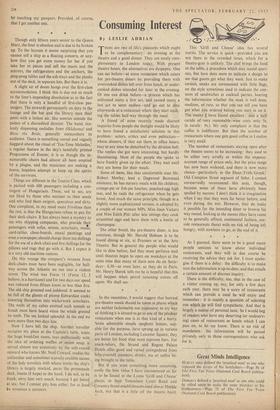Consuming Interest
By LESLIE ADRIAN 'THERE are two of life's pleasures which ought to be complementary : an evening at the theatre and a good dinner. They are rarely com- plementary in London today. With present theatre hours, the alternatives are dyspeptic. One can eat before—at some restaurant which caters for pre-theatre diners by providing them with overcooked dishes left over from lunch, or under- cooked dishes intended for later in the evening. Or one can drink before—a process which has enlivened many a first act, and caused many a last act to seem endless—and go out to dine afterwards at a restaurant where they start stack- ing the tables half-way through the, meal.
A friend of mine recently made discreet inquiries from people she thought would be likely to have found a satisfactory solution to this problem : actors, critics and even politicians— whose dinners, if they eat them in office hours, may at any time be disturbed by the division bell. The replies she got were interesting, but hardly illuminating. Most of the people she spoke to have frankly given up the effort. They wait until they are home for their meals.
Some of them, like that comfortable man Mr. Robert Morley, lead a Dagwood Bumstead existence; he has nursery meals with his children; cottage-pie or fish-pie lunches, poached-egg high teas, and he raids the refrigerator when he gets home. And much the same principle, though in a slightly more sophisticated version, is adopted by a couple of our women MPs, Miss Joan Vickers and Miss Edith Pitt; after late sittings they cook scrambled eggs and have them with a bottle of champagne.
The other breed, the pre-theatre diner, is less common, though Mr. Harold Hobson is to be found dining at six, at Pruniers or at the Arts Theatre. But in general the people who would like to dine before, feel they must perforce wait until theatres begin to open on weekdays at the same time that many of them now do on Satur- days: 8.30—or even later, as they do in Paris. Mr. Henry Sherek tells me he is hopeful that this will happen when petrol rationing comes off again. We shall see.
In the meantime, 1 would suggest that hurried pre-theatre meals should be taken at places which are neither fashionable nor expensive; to my way of thinking it is absurd to go to one of the plushier restaurants when one is in that kind of a hurry. Sonic admirable simple spaghetti houses, suit- able for the purpose, have sprung up in various parts of London, including Leicester Square; they are better for food than most espresso bars. For snack-takers, the Strand and Regent Palace Hotels offer good and varied smorgesbrod from help-yourself counters; drinks, tea or coffee be- ing brought to the table.
But if you want something more sustaining, easily the best value I have encountered so far is to be found in the Lyons 'Grill and Cheese' places, in their Tottenham Court Road and Coventry Street establishments (and also at Marble Arch, but that is a little off the theatre beat). This 'Grill and Cheese' idea has several merits. The service is quick—provided you are not there in the crowded times, which for a theatre-goer is unlikely. The chef brings the food to the table, a procedure which may sound spuri- ous, but here does seem to indicate a design to see that guests get what they want. Just to make certain, steaks are surmounted with little flags, on the style sometimes used to indicate the con- tents of sandwiches at cocktail parties, bearing the information whether the steak is well done, medium, or rare, so that you can tell you have got what you ordered before you start in on it. The steaks I have found excellent : and a half carafe of very reasonable wine costs only Ss. (a carafe : 9s.). My only complaint is that the coffee is indifferent. But then the number of restaurants where one gets good coffee in London is very small.
The number of restaurants staying open after the theatre seems to be increasing: they used to be either very scruffy or within the expense- account range of prices only, but the price range has now been widened, and there is now more choice—particularly in the Dean/Frith/Greek / Old Compton Street segment of Soho. I cannot unreservedly recommend this area, though, because some of them have obviously been spoiled by success: I don't think it is imagination when I say that they were far better before, and even during, the war. However, they do make it possible for the intending diner to browse his way round, looking at the menus (they have come to be generally affixed, continental fashion, out- side restaurants there) with no risk of being left hungry, with nowhere to go, at the end of it.
* * As I guessed, there seem to be a good many people anxious to know about individual restaurants, and they will in due course be receiving the advice they ask for. I must apolo- gise if there is a delay : the difficulty is to make sure the information is up-to-date; and that entails a certain amount of discreet inquiry.
There is the difficulty, too, that in the case of a visitor coming up, say, for only a few days each year, there may be a score of restaurants which can provide a meal he will enjoy and remember : it is mainly a question of selecting one which he will find sympathetic. And that is largely a matter of personal taste. So I would beg of readers who have any deserving (or undeserv- ing) cases of restaurants or hotels which I can pass on, to let me know. There is no risk of inundation : the information will be passed privately only to those correspondents who ask for it.










































 Previous page
Previous page